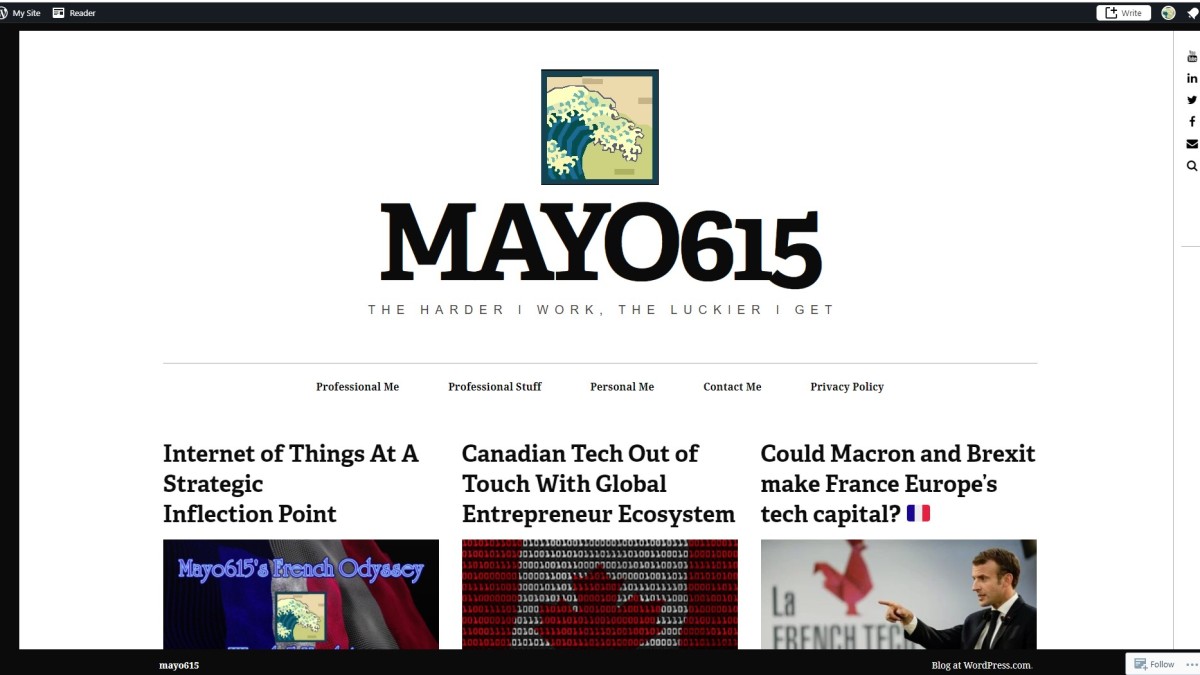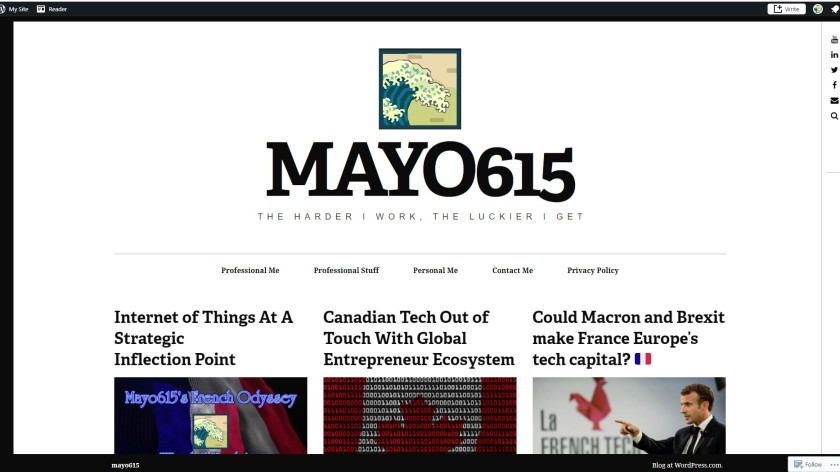We are witnessing an extraordinary global upheaval, the outcome of which seems very uncertain at best. In my view, it is a populist reaction to globalization, and a dramatic shift in politics around the World, from economic issues to cultural issues. I see globalization as ultimately an inevitable evolution of human culture, but which by its very nature and the acceleration in the pace of change with the World Wide Web, is fomenting unrest and reaction. Marshall McLuhan, the great Canadian visionary correctly predicted the rise of the “global village” in the 1960’s. But neither McLuhan nor we foresaw the backlash against the Internet and efforts by China, Russia, Turkey and other countries to block free access to the Internet. The global economy also has essentially stagnated since the Global Financial Meltdown. This has been a warning of greater issues rising up around the World. Xenophobia, racism, gender issues, freedom of expression, environmentalism, and terrorism have displaced economics as the top political issues. How this all plays out in the “global village” is anyone’s guess.
The Rise of Populism and Cultural Politics: A Reaction to Globalization
The Decline of Economics As the Pivotal Issue of Politics
We are witnessing an extraordinary global upheaval, the outcome of which seems very uncertain at best. In my view, it is a populist reaction to globalization, and a dramatic shift in politics around the World, from economic issues to cultural issues. I see globalization as ultimately an inevitable evolution of human culture, but which by its very nature and the acceleration in the pace of change with the World Wide Web, is fomenting unrest and reaction. Marshall McLuhan, the great Canadian visionary correctly predicted the rise of the “global village” in the 1960’s. But neither McLuhan nor we foresaw the backlash against the Internet, efforts by China, Russia, Turkey and other countries to block free access to the Internet and simultaneously the rise of xenophobia, racism and economic protectionism. The global economy also has essentially stagnated since the Global Financial Meltdown. This has been a warning of greater issues rising up around the World. Xenophobia, racism, gender issues, freedom of expression, environmentalism, and terrorism have displaced economics as the top political issues. How this all plays out in the “global village” is anyone’s guess, but it is also important to remember the lesson of King Canute, who insisted he could stop the waves.

Backlash Against Marshall McLuhan’s “Global Village” Unlikely To Stop The Waves
I am sharing here a seminal editorial on this issue by Fareed Zakaria, of CNN GPS, perhaps the best media program on international politics. Zakaria cites the recent study by Richard Inglehart and Pippa Norris at the Harvard Kennedy School of Government, which supports the ideas expressed here. I have also provided a link to the Harvard study.
WHY WE ARE ALL DEPLORABLES NOW
Posted by Fareed Zakaria on September 15, 2016

By Fareed Zakaria
Thursday, September 15, 2016, The Washington Post
Source: Why we are all deplorables now
Whether you put them in a basket or not, the question of this election is: Who are Donald Trump’s supporters? One way to answer that question is to widen its scope beyond the United States. Trump is part of a broad populist trend running across the Western world. Over the past few decades, we have seen the rise of populism — both left- and right-wing — from Sweden to Greece, Denmark to Hungary. In each place, the discussion tends to focus on forces that are particular to each country and its political landscape. But it’s happening in so many countries with so many different political systems, cultures and histories that there must be some common causes.
Harvard Kennedy School of Government Study
While populism is widespread in the West, it is largely absent in Asia, even in the advanced economies of Japan and South Korea. It is actually in retreat in Latin America, where left-wing populists in Venezuela, Argentina and Bolivia ran their countries into the ground over the past decade. But in Europe, we have seen a steady and strong rise in populism almost everywhere. In an important research paper for Harvard’s Kennedy School of Government, Ronald Inglehart and Pippa Norris calculate that European populist parties of the right and left have gone from 6.7 percent and 2.4 percent of the vote in the 1960s, respectively, to 13.4 percent and 12.7 percent in the 2010s.
Read More:Trump, Brexit and the rise of Populism, Inglehart and Norris, Harvard Kennedy School of Government
The most striking finding of the paper, which points to a fundamental cause of this rise of populism, is the decline of economics as the pivot of politics. The way we think about politics today is still shaped by the basic 20th-century left-right divide. Left-wing parties advocated increased government spending, a larger welfare state and regulations on business. Right-wing parties wanted limited government, fewer safety nets and more laissez-faire policies. Voting patterns reinforced this ideological divide, with the working class voting for the left and the middle and upper classes for the right.
Inglehart and Norris note that the old voting patterns have been waning for decades. “By the 1980s,” they write, “class voting had fallen to the lowest levels ever recorded in Britain, France, Sweden, and West Germany. . . . In the U.S., it had fallen so low [by the 1990s] that there was virtually no room for further decline.” Today, an American’s economic status is a far worse predictor of voting preferences than, say, his or her views on same-sex marriage. The authors also analyzed party platforms in recent decades and found that, since the 1980s, economic issues have become less important. Non-economic issues — social, environmental — have greatly increased in importance.
I wonder whether this is partly because left and right have converged more than ever on economic policy. In the 1960s, the difference between the two sides was vast. The left wanted to nationalize industries; the right wanted to privatize pensions and health care. While politicians on the right continue to make the laissez-faire case, it is largely theoretical. In power, conservatives have accommodated themselves to the mixed economy as liberals have to market forces. The difference between Tony Blair’s policies and David Cameron’s was real but historically marginal.
This period, from the 1970s to today, also coincided with a slowdown in economic growth across the Western world. And in the past two decades, there has been an increasing sense that economic policy cannot do much to fundamentally reverse this slowdown. Voters have noticed that, whether it’s tax cuts, reforms or stimulus plans, public policy seems less powerful in the face of larger forces. As economics declined as the central force defining politics, its place was taken by a grab bag of issues that could be described as “culture.” It began, as Inglehart and Norris note, with young people in the 1960s embracing a post-materialist politics — self-expression, gender, race, environmentalism. This trend then generated a backlash from older voters, particularly men, seeking to reaffirm the values they grew up with. The key to Trump’s success in the Republican primaries was to realize that while the conservative establishment preached the gospel of free trade, low taxes, deregulation and entitlement reform, conservative voters were moved by very different appeals — on immigration, security and identity.
This is the new landscape of politics, and it explains why partisanship is so high, rhetoric so shrill and compromise seemingly impossible. You could split the difference on economics — money, after all, can always be divided. But how do you compromise on the core issue of identity? Each side today holds deeply to a vision of America and believes genuinely that what its opponents want is not just misguided but, well, deplorable.
(c) 2016, Washington Post Writers Group















